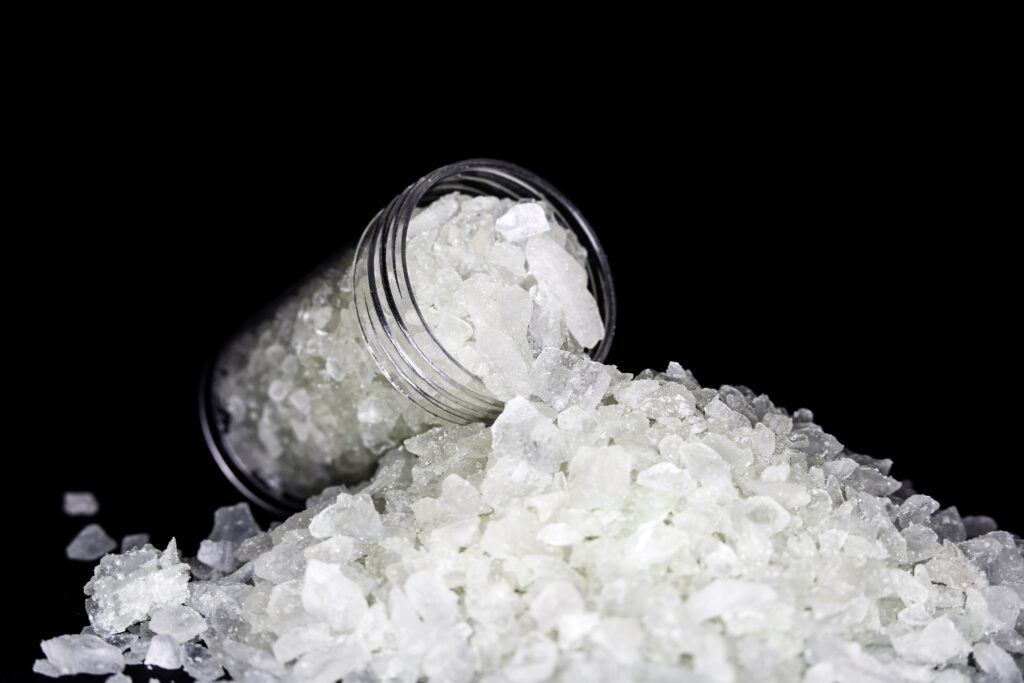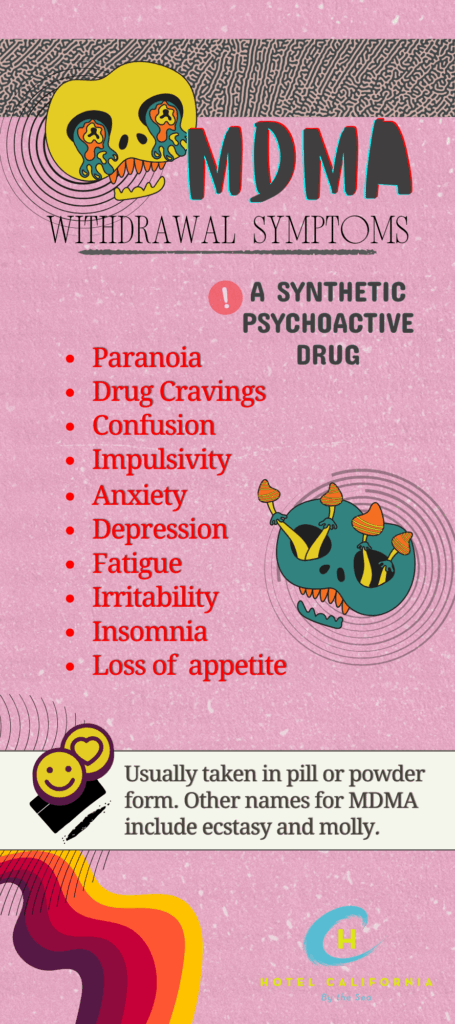MDMA Withdrawal Symptoms
Ecstasy is an extremely psychologically addictive drug that can lead to the development of MDMA withdrawal symptoms. Because it is psychologically addictive, withdrawal symptoms tend to also be psychological, with some also experiencing physical withdrawal. Because MDMA is derived from amphetamines, it can become extremely addictive. The Schedule I controlled substance is illegal to possess for any reason.

MDMA withdrawal symptoms are typically less severe compared to other mind-altering drugs. The physical withdrawal symptoms tend to resolve more quickly, while the psychological withdrawal symptoms can be more difficult to overcome.
However, even if a person has not become dependent on the drug, they can still experience withdrawal symptoms. These are not exactly withdrawal symptoms, but they are similar symptoms that are referred to as part of an MDMA comedown.
A well-known club and party drug, MDMA is very popular among younger users. A recent survey of young people found that an estimated 43% of those who reported using MDMA met the diagnostic criteria for dependence. Dependence on a drug is characterized by evidence of continued use despite experiencing physical or psychological withdrawal effects.
What is MDMA?
MDMA is also known by other names such as ecstasy and molly. It is a synthetic psychoactive drug that can produce a euphoric high. It is a unique drug in that it can induce stimulant-like effects as well as hallucinatory effects.
The drug produces feelings of confusion, sleep problems, drug cravings and the development or worsening of anxiety and depression. Because of its addictive nature, these symptoms can occur even during the first use of the drug.
It is a popular party drug taken in clubs and raves and often alongside other substances like alcohol. It is usually taken as a capsule or tablet.
How does it work?
When you take MDMA, it increases the activity of neurotransmitters in the brain: serotonin, norepinephrine and dopamine. It specifically increases the ones that influence the emotions of happiness and love, resulting in the euphoric high being associated with positive emotions.
Its primary effect on the brain is its impact on serotonin levels. MDMA overcharges the brain’s level of serotonin by blocking the reuptake of serotonin, so there is more available for use. Serotonin is a brain chemical that plays an important role in mood regulation, feelings of aggression, sexual activity, sleep and sensitivity to pain.
After the MDMA effects have subsided, the user can begin to experience withdrawal symptoms such as depression and exhaustion. These effects can last for hours and even days after drug use has stopped. At the same time, it can deplete the brain’s supply of those same chemicals that is needed to feel pleasure naturally.

MDMA Withdrawal Symptoms
- Development of or worsening depression – Heightened feelings of sadness and loss of purpose. Sometimes, depression symptoms may manifest later in the withdrawal cycle. When this happens, it can be considered very harmful due to its impact on an increased risk of suicide.
- Development of or worsening of anxiety – Can lead to consistent feelings of panic and irregular mood. Anxiety occurs when the brain is trying to regulate the functioning of neurotransmitters after MDMA withdrawal. The body is constantly in a state of flight.
- Confusion
- Drug cravings – Intense drug cravings can occur when the brain wants to continue feeling euphoric energy
- Paranoia
- Insomnia – Unable to fall asleep or stay asleep
- Fatigue and loss of energy
- Difficulty concentrating
- Loss of appetite and drastic weight loss
- Memory impairment
- Changes in self-perception
- Mood swings and short tempers, including agitation and irritability, can persist for months after drug use has stopped due to an imbalance of serotonin levels.
- Decreased sexual desire or satisfaction
- Impulsivity
- Development of aggressive behaviors
- Muscle and teeth clenching
- Nausea, sweating and chills
Detoxing from the drug can be quite difficult and it can even prevent a user from seeking help and eventually relapsing. MDMA withdrawal can be a very dangerous situation if not carefully monitored with a professional healthcare provider. Feelings of depression can become so serious that they can lead to suicidal thoughts and ideation. If the person is already clinically depressed, it can lead to even more dangerous consequences.
Withdrawal occurs when the user abruptly stops or drastically decreases use of MDMA after becoming dependent on the drug. When this occurs, the brain tries to adjust to functioning without MDMA, causing the development of withdrawal symptoms. Symptoms are the body and brain’s response to a lack of MDMA in the system because without it, dopamine, norepinephrine and serotonin levels are drastically reduced, throwing the body off balance.
Check Your Insurance Coverage for FREE
Find out if your insurance covers addiction treatment in minutes. We accept most insurance!
MDMA withdrawal timeline
Withdrawal symptoms usually begin within the first 1-3 days of detoxing from the drug. After the first few days, patients will experience symptoms such as anxiety, irritability, insomnia, difficulty concentrating, paranoia and intense feelings of depression.
Between days 4-10, patients will experience continued depression, drug cravings, difficulty sleeping and issues with brain fog and cognition. After a few weeks, most of the withdrawal symptoms should have subsided with some cases of lingering symptoms for several weeks after.
Factors that impact MDMA withdrawal
Factors such as drug tolerance, frequency of MDMA use, individual metabolism, age, gender and biology are important factors that affect withdrawal. Use of other substances alongside MDMA can also impact how severe and the duration of withdrawal.
MDMA is often cut and mixed with other substances like heroin, ketamine, meth and bath salts. Because of this, withdrawal symptoms can differ compared to normal MDMA withdrawal symptoms. Depending on the drug combination, the symptoms, duration and severity of withdrawal will be different.
How to Cope with MDMA Withdrawal Symptoms
Withdrawal symptoms can be very uncomfortable and sometimes difficult to manage. This is especially true if you are doing it on your own. It is recommended to seek out professional help and support when withdrawing from MDMA.
There are a few things you can manage to do on your own to help make the process go smoother. Self-care. Stay hydrated. Eat a healthy, nutritious and balanced diet. Increase your physical activity. Have a good sleep routine. Practice mindfulness and meditation. Attend a stress management class or therapy.
Reach out to Hotel California by the Sea
We specialize in treating addiction and other co-occurring disorders, such as PTSD. Our Admissions specialists are available to walk you through the best options for treating your addiction.
Treatment for MDMA Addiction
Regular use of MDMA can put a person at risk for developing dangerous long-term psychological issues such as anxiety, depression and difficulty with memory and cognition. Long-term use of the drug will eventually lead to effects such as irregular heart activity, risk of heart disease, impulsive behaviors, impaired brain cognition and impaired brain functioning.
Withdrawing from MDMA can be extremely psychologically painful. If not treated properly, users may begin turning to other substances in an attempt to self-medicate to manage their psychological symptoms. Professional behavioral health programs such as Hotel California by the Sea provide individualized substance use disorder treatments.
We offer treatments at all levels of care, including detox, residential, PHP and IOP. We utilize evidence-based methods such as CBT, DBT and EMDR therapy. Hotel California by the Sea is dedicated to helping clients reach their goals in sobriety and overcome their addiction.
References:
https://www.addictioncenter.com/drugs/ecstasy/withdrawal-detox
https://zinniahealth.com/substance-use/mdma/withdrawal
https://www.addictions.com/ecstasy-addiction/ecstasy-withdrawal
https://addictionresource.com/drugs/mdma/withdrawal-and-detox
https://www.rehabspot.com/drugs/stimulants/ecstasy/withdrawal-detox
